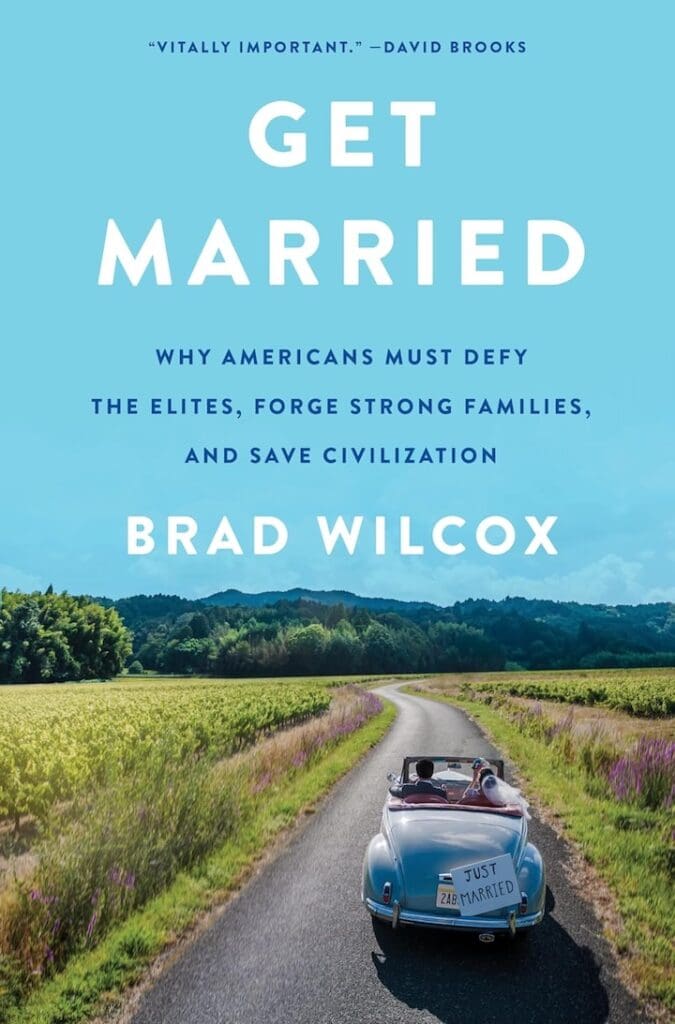Much of our knowledge is inevitably quantitative and additive, but sometimes a good book contains such necessary, valuable forms of human knowledge while also touching, and being graced by, such qualitative insight that it registers as human wisdom. Such is the case with University of Virginia sociologist Brad Wilcox’s ambitious Get Married: Why Americans Must Defy the Elites, Forge Strong Families, and Save Civilization.
Wilcox is a strong statistician, and his book is full of exceptionally valuable, detailed information and analysis about contemporary social and economic phenomena in the USA and the West. It’s particularly insightful about catastrophically declining birth rates, marriage rates for different demographic groups, and surveys of several negative social indicators such as unemployment of men, drug abuse, loneliness, and “deaths by despair.”
His thoughtful and judicious grasp of these phenomena and their dynamics puts him among the outstanding public intellectuals and commentators of our time, and merits the name social philosophy: a tradition of over two centuries which includes Burke, Tocqueville, Durkheim, Weber, and more recent figures such as Robert Nisbet, Raymond Aron, Daniel Bell, Philip Rieff, David Martin, Peter L. Berger, and Wilcox’s Virginia colleague James Davison Hunter.
An excellent example of this social-philosophical insight is found near the conclusion of Get Married when Wilcox writes that his research “reveals this paradox regarding the pursuit of happiness in contemporary America: individual happiness is most likely to be found not by directly pursuing it for oneself but by opening your heart to love, marriage, and living for your spouse and family.”
Wilcox here vindicates an argument or thesis that has been intermittently meditated in the philosophical, political, religious, and poetic literature of the West, what Plato and Aristotle first articulated and that we have come to call “virtue ethics” or eudaemonism. It has also been the stock-in-trade of centuries of moralists and clergymen.
The Anglican Bishop Joseph Butler (1692-1752) identified “the paradox of hedonism” in a famous sermon and the Victorian philosopher Henry Sidgwick (1838-1900) wrote about it in his Methods of Ethics. Their point, writes the contemporary philosopher Simon Blackburn, is “that agents who consciously attempt to maximize their own pleasures are more likely to fail than those who have concerns for other things and other persons for their own sakes.”
A particularly poignant case is found in the Autobiography of John Stuart Mill (1873), the great Utilitarian philosopher, most of which is exceptionally dry, leading Thomas Carlyle to call it the “autobiography of a steam engine.”
But one chapter records Mill’s mental breakdown. Mill, a child prodigy and successful public intellectual, records a mental collapse, not apparent to the public world in which he continued to live and work. From 1821 to 1826, he had been the companion and inheritor of the growing political prominence of his own Utilitarian father, James Mill, and of Jeremy Bentham: his “object in life was to be a reformer of the world,” and he seemed to be succeeding in journalism and politics.
But Chapter V reports an increasing gloom at the realization that his direct, successful pursuit of Utilitarian ideological aims left him more and more unsatisfied and depressed. He came to credit “the anti-self-consciousness theory of [Thomas] Carlyle” with helping him shape a new “theory of life.”
He “never wavered” in his Utilitarian conviction that happiness is the test of all rules of conduct, and the end of life.” But he “now thought that this end was only to be attained by not making it the direct end. Those only are happy who have their minds fixed on some object other than their own happiness: on the happiness of others, on the improvement of mankind. . .followed not as a means, but as itself an ideal end. Aiming thus at something else, they find happiness by the way.”
Mill’s understated meditations in this chapter have a pathos, eloquence, and depth altogether lacking in his other writings, however prominent and influential they once were and, in some cases, still are. Although he was plagued with recurrent bouts of depression for the rest of his life, his long friendship and subsequent marriage to Harriet Taylor ‘saved’ him.
The Austrian Jewish psychologist Viktor Frankl (1905-1997) had a far more profound, agonizing experience of suffering. He spent three years in German concentration camps during World War II, camps where both his parents perished.
In 1946 he published the memoir and psychological study of this experience under the tile From Death-Camp to Existentialism and a few years later as Man’s Search for Meaning. By the time of his death in 1997, the book had sold two million copies and had become a classic of narrative, introspection, and philosophical psychology.
One of its major themes, based on his experience in the concentration camps, was the hedonistic paradox. As he put it in one of his later books:
Being human is always directed, and pointing, to something or someone other than oneself, to a meaning to fulfill or another human being to encounter. . .a person to love. [The human person becomes a true self] not by concerning himself with his self’s actualization, but by forgetting himself and giving himself. . .and focusing outward. . . .What is called self-actualization is, and must be, the unintended effect of self-transcendence: it is ruinous to make it the target of intention.
Frankl even went so far as to say that “It is the very ‘pursuit of happiness’ that obviates happiness.”
Prof. Wilcox’s insight in Get Married is thus a revival of a classic psychological-philosophical perception. Plato, Aristotle, the Biblical writers, and St. Thomas Aquinas were not airy idealists or escapists when they praised the values of the true and the good external to the self. They were wise human realists.
The point was given memorable formulation by the great Samuel Johnson: “But what is success to him who has none to enjoy it? Happiness is not found in self-contemplation; it is perceived only when it is reflected from another.”











